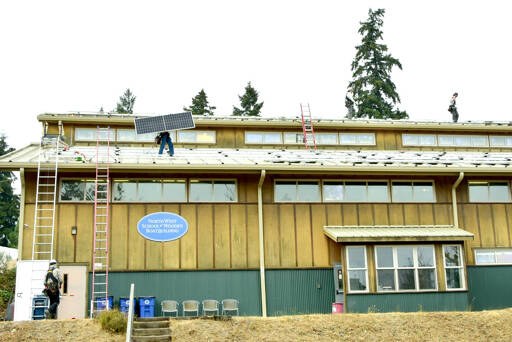PORT HADLOCK — The Northwest School of Wooden Boatbuilding has installed 164 solar panels on the roofs of the Marine Systems and Hammond Boatbuilding shops, a move expected to save the school some $9,000 in electrical costs annually.
“Not only will the installation provide a long-term financial benefit to the school but it also aligns with the school’s goal to be a good environmental steward in the community,” while embracing technological advancements, according to Executive Director Betsy Davis in a press release.
“At the Boat School, students learn and work with traditional craft and also work with and experience the most up-to-date technologies, whether in boat building or marine systems,” she said.
The cost of the project, which was completed earlier this month, was $170,000. The Institute for Law and Systems Research donated $150,000 to the school to fund the project.
The school, at 42 N. Water St. in Port Hadlock, is still raising the other $20,000 to complete the funding picture, Davis said in an email on Sunday.
The next step is for the Jefferson County Public Utility District to integrate the solar system into the grid, which is expected sometime in November, Davis said.
“At a rated capacity of over 80 kilowatts, the Boat School will have one of the largest solar power systems in Jefferson County, providing power for the next 25 years and significantly reducing utility bills by offsetting 99 percent of the upper campus’ electrical needs,” said Hans Fredrickson, president of Cascadia Solar of Port Townsend, the solar installation branch of Fredrickson Electric, which designed and installed the solar panel project.
“We appreciate the leadership of local organizations like NWSWB showing the way towards a sustainable future.”
The system also is expected to reinforce learning for students in the Marine Systems program, led by Kevin Ritz.
“Solar technology is very much a part of today’s boats,” Ritz said.
“Having this as part of the school’s grid will familiarize students with the technology and solidify it as a viable power option.”
The panels are expected to generate a savings of more than $200,000 over the life of the system, according to the release, which added that each year the project’s carbon offset is the equivalent of driving 71,558 fewer miles or planting 18,532 trees that year.
The mission of the environmentally-based philanthropy agency, the Institute for Law and Systems Research, led by Alice Anda and James Ward, is “creating systems and support for a sustainable future.”
“The Institute’s mission dovetails nicely with the general sense of self-reliance found in the communities of the Olympic Peninsula,” according to the press release.
No strangers to the Boat School, the institute was also a major supporter of the solar-powered, all-electric, Clean Bay pumpout boat built by the boat school and currently working at the Port Ludlow Marina.
An initial meeting with Davis and Ritz in 2018 sparked a “flurry of activity to establish the first steps of a network and support system for sharing and promoting alternatives to carbon-emitting boat propulsion within the boating community,” Anda said.
“With the success of the Clean Bay project, the ‘solarization’ of the Boat School was a natural extension of the Institute’s support,” she added.
The gift from the institute is to be provided over two years. To get the project done now, Craft3, a nonprofit lender with offices located in Port Angeles, provided a Clean Energy Fund loan to bridge the institute’s grant for the project.
Craft3 was also instrumental in helping launch the Marine Systems Program.
“Our relationship with the Boat School has been a great partnership,” said Erike Lindholm, Craft3 business lender, in the release.
“Institutions like the Boat School create lasting positive change, and we are proud to have helped leverage their work for the benefit of the community.”

